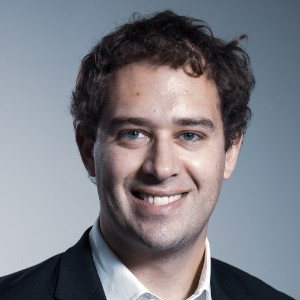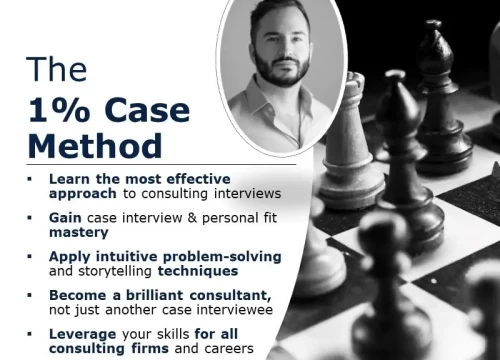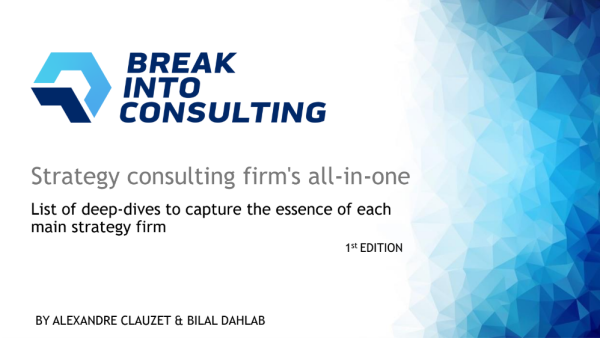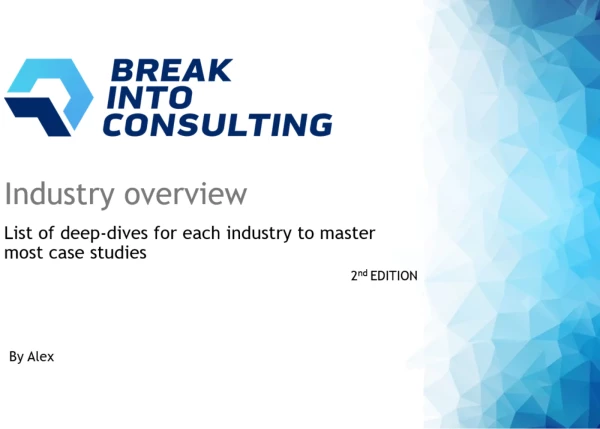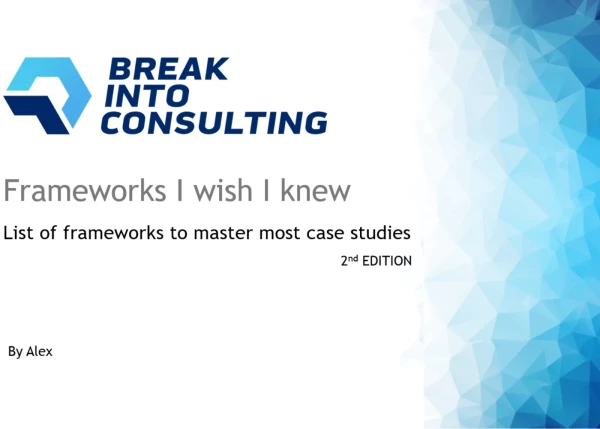What do you think are the main learnings as a first year consultant? What are some things you cannot learn in consulting in the first year (say it takes 2 - 3 years)?
Get Active in Our Amazing Community of Over 452,000 Peers!
Staying in consulting for 1 year or less - what are the learnings?
Overview of answers
Hi there,
Some good answers here already.
I would like to add a new perspective of how to manage your lifestyle and ideally push beyond 2 years in the industry:
The stress is pretty common and natural given the types of engagements, expectations, and work hours. However, before quitting I'd try to find other ways to improve your lifestyle to extend your employment up to 2 years.
- Take extra vacation days/ weeks between projects (McKinsey has 'Take-Time', i guess others have similar programs,...)
- Change your perspective. If you do not plan to build a long-term career with your firm, there is NO need to sweat the smaller stuff. Based on what you say about your performance, you are already well-established. That gives you a lot of room to build your own regiment compared to low-performers. How? (Push back unreasonable requests, block 'me' time during the week, manage lifestyle expectations from the beginning of an engagement,...)
- Use the weekends to recharge (friends, family, short getaways,...); block all weekend work if there even is any
- Optimize the projects you are working on (look for projects that are long-running, a client that has been a long-term client of your firm, work with people you enjoy working with from leadership to project management,...)
- Minimize travel, which always creates extra stress (unless you are a fan of separating work and leisure time)
- Learn how to become more resilient (sports, mindfulness,...)
- Stretch the duration between projects by doing classic beach work (proposals, research stuff,...
- ....
As you see, there are many ways to improve your lifestyle that have control over. It might take a while but if you manage to implement some of these tips you might reduce your perceived stress considerably AND get the benefit of staying with an MBB for 2 years.
Remember, it is all a game and the short term stressors (short term changes, f*ck-ups, etc.) are often overblown to a comical extent when looking at them now in hindsight.
All the best with your decision!
Cheers,
Florian
Hi there,
I think this is an interesting question that may be relevant for many people. I would be happy to share my thoughts on it:
- In the first year of strategy consulting, you will most probably experience a steep learning curve when it comes to problem-solving, communication, and teamwork. While you might have gathered some initial insights into these skills through internships or university, working in strategy consulting will develop them to a whole new level. Moreover, obviously, you will most likely further develop your quantitative skills.
- However, you will most likely be restricted when it comes to achieving a well-rounded portfolio of consulting projects, as well as experiencing proper leadership skills. Lastly, for obvious reasons, you will not be able to develop deeper industry expertise.
If you would like a more detailed discussion on how to address your specific situation, please don't hesitate to contact me directly.
Best,
Hagen
Hello,
Here are my thoughts:
1) It is improbable to be lucky enough to be plotted with the best managers/partners, the best clients in your most favourite industry in the first year.
2) Often times, new joiners are plotted on projects that are not already taken up by high performing team members who have certain preferences. Thus you may end up getting a difficult project, or have to with in an unattractive function/industry.
3) By working for 2-3 years, you have given yourself the chance to work with multiple people, multiple clients in different functions and industries. With this, you will be able to select the best highlights to put on your CV for future opportunities - which may have happened only in Year 2 or 3.
4) By your second year, you are familiar with the culture, things to do, things to avoid and thus are able to begin enjoying the work too, as opposed to just playing catch up. That's when you start developing skills for the long run!
Best,
Rushabh
After 1 year you are still an analyst. An analyst does research, analysis and executes slides, and may conduct some expert interviews. You are expected to be producing client-ready, mistake-free analysis and slides. This is actually what you learn doing in your first year. It is very valuable, as it means you start having the kind of analytical rigour that consultants are valuable for. You may have learnt the very basics about one industry if you are lucky. And that's it.
However, is usually performing work that is told to do, and very often is told how to do it. So the analyst is executing, usually “piece by piece”, but not really having the ownership of the problem, not really thinking about what analysis need to be done, nor alternative ways to solve the problem, not thinking about how to communicate a “story”, not managing clients, etc…
Adding on to the other coaches' answers..
Usually in the first year you learn a fair part of the typical hard skill foundations (problem structuring & analytical problem-solving, building slides, MS excel and other analytics tools, e.g. Tableau).
What takes longer in my experience is the softer side of the business, epecially learning the nuances in communications and storylining that's better tailored to the addressed audience. Also, learning how to effectively manage different stakeholders and become and more practical / efficient (→ 80/20) at what you do usually takes time.
In case you're asking to gauge the optimal tenure before exit, one more aspect to consider - Consulting, to many people, is not just about learning new skills, but also about building your track record / reputation. With that in mind, staying beyond the 1 year mark, let's say for 2-3 years definitely helps you establish additional credibility with future employers, business stakeholders etc.
Hope this helps.
Regards, Andi
(edited)
Hi there,
Sharing my thoughts based on going through that journey but also leading teams with consultants of varying tenures
Depth/mastery
- This is one of the key differences between a Y1 consultant vs a Y3 or Y4 consultant
- The skills that are being built are not fundamentally different, but what changes is the expected level of mastery or proficiency
- Someone who has spent 2 more years and getting greater exposure will have honed slide making, problem solving more than someone who has only spent 1 year
- This is true not just for the hard skills (e.g. excel, ppt, tableau etc), but also for soft skills (e.g. comms, client management)
Ownership (mindset)
- By far this is the biggest difference between an Associate and Consultant 2nd year in BCG and is something that someone can develop in 1 or even 2 years
- The more tenured you get, the more you need to demonstrate end-to-end ownership → from planning your workstream all the way to engaging stakeholders
- This is why towards the end of the Consultant role in BCG, you are already expected to be performing as a “Mini Project Leader” and performing at the next level
Navigating the firm / network
- Last but not least, this is something that becomes better the longer you stay in consulting
- Understanding how the firm works, how to get what you want, how to navigate leadership, support functions, opportunities → these all come with spending a longer time in the firm


